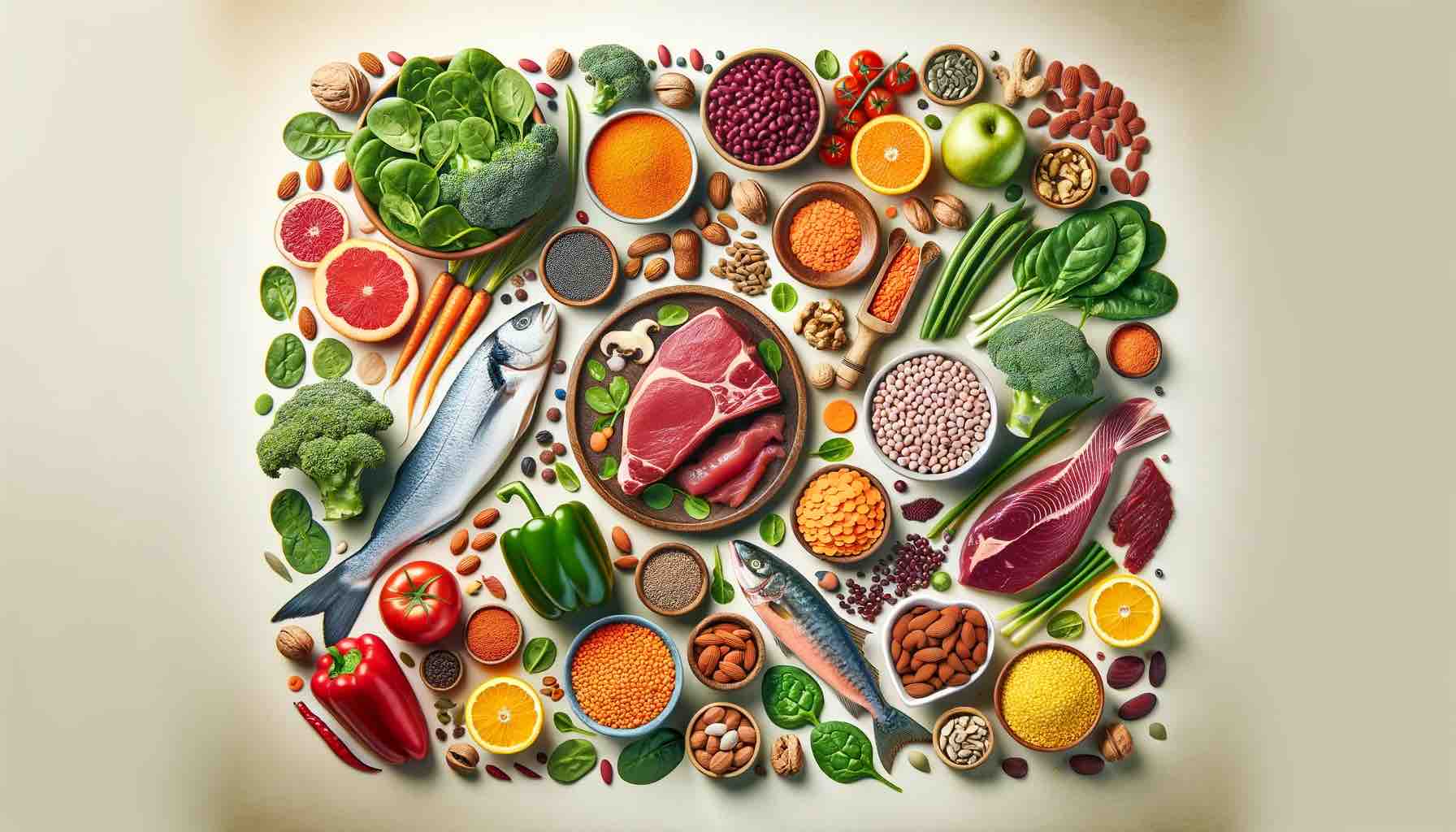
Introduction
Iron, a fundamental mineral in human health, is best known for its role in forming hemoglobin, but its impact extends far beyond. Iron’s functions in the body are diverse, influencing everything from energy levels and physical endurance to cognitive function and immune defense. In this comprehensive post, we’ll explore iron in depth: its roles, sources, the importance of maintaining optimal levels, and strategies to prevent both deficiency and excess.
Exploring the Crucial Roles of Iron in the Body
Vital Functions and Impacts
- Oxygen Transportation: As a key component of hemoglobin in red blood cells, iron is essential for transporting oxygen from the lungs to tissues and organs throughout the body.
- Energy Metabolism: Iron is crucial in the conversion of nutrients to energy, particularly in cellular respiration and ATP (adenosine triphosphate) production.
- Brain Function and Development: It supports cognitive development and function, playing a role in neurotransmitter synthesis, brain metabolism, and myelin formation.
- Immune Function: Adequate iron levels are necessary for a healthy immune response, influencing both innate and adaptive immunity.
- Muscle Function: Iron contributes to muscle metabolism and the health of muscle tissues, including the heart muscle.
Diving into Dietary Sources of Iron
Varied and Rich Iron Sources
- Heme Iron: Predominantly found in animal products like red meat, poultry, and fish, heme iron is more readily absorbed by the body.
- Non-Heme Iron: Plant-based foods such as lentils, beans, spinach, fortified cereals, and nuts contain non-heme iron. Pairing these with vitamin C-rich foods enhances absorption.
- Fortified Foods: Some bread and cereals are fortified with iron, providing an additional source for those who may not consume enough from natural food sources.
The Iron Balance: How Much Do You Need?
Tailoring Your Iron Intake
- Recommended Daily Allowances: Men typically require about 8 mg of iron per day, while women need around 18 mg due to menstrual losses. Pregnant women and athletes may have higher requirements.
- Individual Variability: Iron needs can vary greatly due to factors like age, gender, dietary habits, and health conditions.
The Often Overlooked Issue: Iron Deficiency
Recognizing and Addressing Anemia
- Symptoms: Iron deficiency can lead to anemia, marked by fatigue, weakness, pale skin, dizziness, and shortness of breath.
- Vulnerable Groups: Women, children, vegetarians, and blood donors are particularly susceptible to iron deficiency.
- Dietary Strategies: Increasing intake of iron-rich foods, especially heme sources, and combining non-heme sources with vitamin C can enhance absorption.
The Flip Side: The Dangers of Iron Excess
Navigating Iron Overload
- Health Risks: Excessive iron, typically from genetic conditions like hemochromatosis or excessive supplementation, can lead to liver damage, heart problems, and diabetes.
- Management: Regular monitoring and medical supervision are essential for those at risk of iron overload.
Implementing a Balanced Iron Approach
Strategies for Maintaining Ideal Iron Levels
- Diverse Diet: Focus on a balanced diet with a variety of iron sources, both heme and non-heme.
- Mindful Supplementation: Supplements should be considered when dietary intake is insufficient and under medical advice, particularly for groups at risk of deficiency.
- Regular Blood Tests: Monitoring iron levels, especially for those with a history of anemia or iron overload, can help maintain optimal health.
Conclusion: Embracing the Power of Iron
Iron’s multifaceted roles in our health cannot be overstated. From energizing our bodies to empowering our immune system, iron is a key mineral that demands attention. Understanding its importance, recognizing the signs of imbalance, and adopting dietary strategies to maintain appropriate levels are integral steps toward harnessing the full benefits of iron for a healthy, vibrant life.
FAQs
- What are the primary functions of iron in the body?
- Iron is crucial for producing hemoglobin in red blood cells, which carries oxygen throughout the body. It’s also essential for energy metabolism, immune function, and brain development.
- How can I tell if I have an iron deficiency?
- Signs of iron deficiency include fatigue, weakness, pale skin, shortness of breath, dizziness, and in severe cases, chest pain or cold hands and feet.
- What foods are high in iron?
- Foods rich in iron include red meat, poultry, fish, leafy green vegetables like spinach, legumes like beans and lentils, nuts, seeds, and iron-fortified cereals.
- How much iron do I need daily?
- The recommended daily intake varies: adult men and postmenopausal women need about 8 mg, whereas menstruating women need about 18 mg. Pregnant women require even more, around 27 mg daily.
- Can taking iron supplements be harmful?
- Excessive iron, especially from supplements, can lead to iron overload, damaging organs like the liver and heart. It’s important to take supplements only under medical supervision.
- Is iron more important for women than men?
- Iron is important for everyone, but women, particularly those who menstruate, are at a higher risk of iron deficiency and may need more iron in their diet or through supplements.
- How does iron deficiency affect children and adolescents?
- In children and adolescents, iron deficiency can impair cognitive development, decrease energy levels, and hinder growth.
- What’s the difference between heme and non-heme iron in foods?
- Heme iron, found in animal products, is more easily absorbed by the body. Non-heme iron, found in plant-based foods, is less readily absorbed but still a vital iron source.
- Can a vegetarian diet provide enough iron?
- Yes, vegetarians can get enough iron from plant-based sources like legumes, leafy greens, and fortified cereals, especially when consumed with vitamin C-rich foods to enhance absorption.
- Does iron play a role in athletic performance?
- Adequate iron is crucial for athletes since it aids in oxygen transport and energy production, enhancing endurance and performance.
Blog Tags for the Post:
iron nutrition, anemia prevention, iron-rich foods, dietary iron, women’s health, vegetarian sources of iron, iron supplements, hemoglobin, athletic performance, child development








